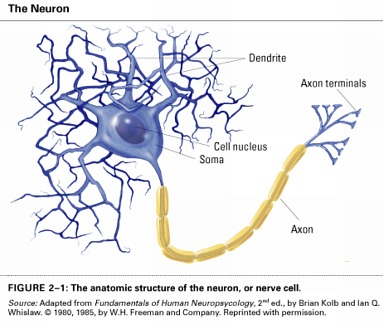Mechanism for SSRI Medications
Serotonin
Serotonin is a neurotransmitter (brain chemical) that is associated with many important functions, such as sleep, appetite, and sex drive.
Serotonin is sometimes abbreviated 5-HT (5-hydroxytryptamine).
Too little serotonin may be associated with disorders like major depression, obsessive-compulsive disorder and other anxiety disorders.
Prozac may help to correct this by increasing the brain's supply of serotonin.
Biology Review: The Neuron
To understand how Prozac works, it may be helpful to review some basic brain biology. The typical brain cell, or neuron, is comprised of three main parts: axon, cell body, and dendrites. The dentrides are like spindly branches that protrude off the neuron. The axon is one long protrusion that is like the trunk of a tree. The axon from one neuron connects to the dentrides of many others.
The synapse is the point of connection between neurons — the little space or gap between the axon of one neuron and the dentride or cell body of the next. Electrochemical communication between neurons takes place at these junctions.
Some cells in the nervous system have as many as two hundred thousand synaptic connections.

Neurotransmission
Neurotransmitters are chemicals released from the axon that swim across the synapse to carry the "message" to the cell on the other side.
Receptors are molecules that stick off of the receiving cell.
Each receptor has a specific shape, and the neurotransmitter fits in like a key.
Common neurotransmitters include serotonin, dopamine, norepinephrine, epinephrine (adrenaline), and many others.

Prozac
When serotonin is released from the "sending" nerve cell, the leftover serotonin is normally reabsorbed by an uptake pump.
By blocking the uptake pump, Prozac increases the amount of active serotonin that can be delivered to the "receiving" nerve cell.
This means that the neurons steep for a longer period of time in the serotonin you already produce.
Prozac selectively affects only serotonin which is why Prozac and other similar drugs are called selective serotonin reuptake inhibitors, or SSRIs.
There are other mechanisms as well. The drug blocks the sensor on the axon that tells the cell when enough serotonin has been produced. This causes the axon to release even more serotonin. Finally, over a period of 2-3 weeks, the receiving cell becomes more sensitive to serotonin, and this is the point at which the anti-depressant effect becomes experienced by the patient. It will take several more weeks, however, for the anti-obsessional effects to become completely realized.
Many SSRIs
There are now many types of SSRI medications on the market. Some were developed for specific ailments, and others are for many types of disorders, especially mood disorders, eating disorders, and anxiety disorders. Some common SSRIs are:
- Prozac / Erocap / Lorien / Lovan / Zactin / Sarafem (fluoxetine)
- Zoloft / Lustral (sertraline)
- Celexa / Cipramil (citalopram oxalate)
- Lexapro / Cipralex (escitalopram oxalate)
- Luvox / Floxyfral / Faverin (fluvoxamine maleate)
- Paxil / Aropax / Paroxat / Paxetin / Seroxat (paroxetine)
All SSRI antidepressants are thought to work in a manner similar to how Prozac works.
More about medications for OCD...
Too Much of a Good Thing?
It is possible to have too much serotonin. Taking too much SSRI medication, or other drugs that result in increased levels of serotonin in the body, can cause a problem called serotonin syndrome. The symptoms of this syndrome include changes in mental status (confusion, agitation, mania, anxiety, coma), cardiovascular function (irregular heartbeat, high or low blood pressure), gastrointestinal problems (nausea, diarrhea, abdominal pain), movement problems (muscle contractions or rigidity, restlessness, shaking, loss of coordination, shivering, seizures), and other serious problems.
If you have any of these symptoms, consult your doctor right away!
When Its Over
Patients who abruptly stop certain SSRIs will develop some unpleasant discontinuation symptoms as the brain struggles to regain equilibrium.
Symptoms may include headache, nausea, dizziness, insomnia and agitation,
When allowed to run its course, this problem usually lasts from one to several weeks, and ranges from mild-moderate intensity in most patients, to extremely distressing in a small number. This is why SSRIs should always be slowly tapered off and never abruptly stopped.
Return to Medications for OCD...
Credits: Article written by M. Jahn & and reviewed by M. Williams, Ph.D. Also Prozac website. Eli Lilly and Company. FL-14317-3000000876




